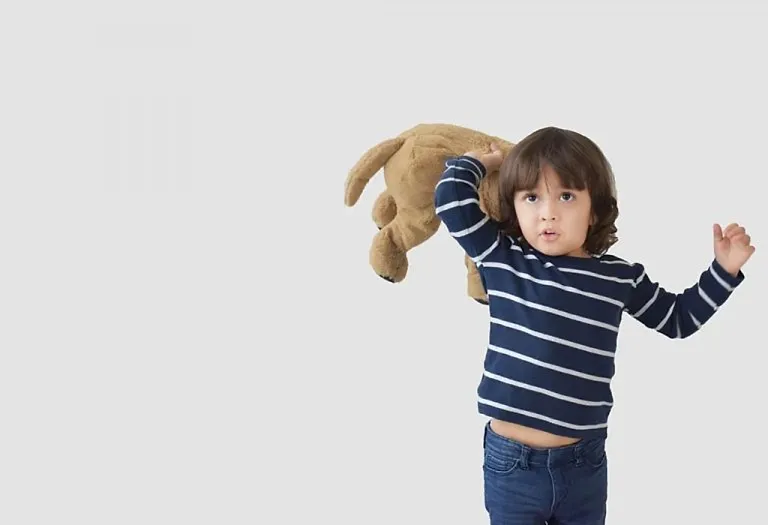Why Do Toddler Ignore You and What to Do About It?
Life with a toddler can be incredibly fun, with every day bringing something new. But some days can also be frustrating, especially when it seems like your little one just doesn’t want to listen to you. You may ask him to pick up something from the floor, and instead, he takes off in the opposite direction. Or he may have selective hearing and only respond once in a while. However, your toddler ignoring you isn’t always a sign of acting out, and may not be as complicated as it seems. Here is why you think “my toddler ignores me” and what you can do about it.
Reasons Why Your Toddler Is Ignoring You

When your child seemingly ignores you, his sole motive may not be to defy you. Try one of the following explanations and find the answer to “why does my toddler not listen to me”:
1. Personality and Independence
Your child will be more assertive at that age, and he is just discovering his personality and independence. If what you’re telling him to do curbs any of these things, he may assert his independence by ignoring you.
2. Different Agendas
At that age, a toddler’s sole purpose in life is to discover new things around, and your instruction may be the opposite of what he wants to do at that moment. So, if he’s running around the house and you tell him to sit down, he may ignore your instruction because he wants to run about and play. Toddlers also have no perception or regard for safety, so your child may not understand why you’re telling him to stop doing something or hurrying him.
3. Overstimulation
As mentioned earlier, a toddler’s day is mainly filled with playing and discovering new things. Toddlers easily get overstimulated, especially when parents sternly repeat instructions or yell at them, so they space out in an attempt to remove themselves from the situation.
4. Dealing With Emotions
If your child is upset or angry about something, ignoring you may be a way of expressing that anger. Toddlers can’t exactly walk out of the house in a fit of anger, so they do the next best thing, by tuning out of the situation. While this may seem better than him throwing things around the house, you should try and get your child to express his emotions, so he knows its a safe space to tell you how he’s feeling.
5. Caught Up in Something
Children don’t have the ability to multitask or focus on multiple things at once. Hence, when they’re solving a puzzle or are engrossed in some activity, they tend to put in all their concentration into it. If you speak to your child and he ignores, he may just not have heard you because he’s busy doing his own thing.
6. Memory
A toddler’s ability to retain information develops over time. Sometimes your child may have genuinely got distracted and forgotten the instruction you gave him, even if it was just a few minutes earlier.
7. Low Impulse Control
Toddlers are very impulsive, so if you tell your little one not to do something, chances are it must be all he can think about now. Of course, this is something that should later be controlled using certain measures so your child listens to you.
What to Do If Your Child Ignores You?

Your child ignoring you doesn’t have to be met by a yelling match. Remember, he’s only a tiny human trying to discover and adjust to the world around him. Here are some things you could do instead.
1. Be Clear and Specific
Instead of saying ‘clean up this space’, say ‘pick up your toys from the floor and put them on that table’. Being clear and specific about what you want your toddler to do will leave out any confusion.
2. Simplify Instructions
Giving your toddler a 3 step instruction will only overstimulate him and make him anxious. Instead, give instructions with only 1-2 steps at a time. You may have to wait while your child catches up, but its better than not having the task done at all, right?
3. Be Understanding
Simply observing how your child reacts to different situations, different tones of voice etc. will give you an idea of how to get through to him. Every child is different, so each of them responds in different manners. Also, expecting your child to drop what he’s doing and follow your instruction is unreasonable, as you wouldn’t want that to be done to you either, right? Understand that your child may be overwhelmed or simply too caught up to listen, so give him some space and time.
4. Follow Through With the Instruction
If you tell your child to stop doing something and he doesn’t, go up to him and do it yourself. For example, if you tell him not to climb on a chair and he just won’t listen, go and pick him up off the chair yourself. Letting it go all the time simply gives kids the idea that not listening will be tolerated.
5. Use Incentives
Reward and punishment are often used together, but even just one aspect without the other works wonders. When it doubt, always go for positive reinforcement. Give your child incentives for listening to you, even if its as small as a sticker, a cookie, or even a compliment. You’ll see how quickly he listens to you.
6. Stop Saying ‘No’
If you constantly say no to whatever your child asks, he/she anticipates a negative response and will simply start ignoring you. That doesn’t mean you have to say yes to every single thing your child wants! Instead, find an alternative to the word ‘no’. For example, if your toddler wants to have chocolate, don’t say no. Say, ‘you can have one after lunch’.
7. Get Their Attention
Gently call their name or try to make eye contact. Sometimes, children get lost in their thoughts or activities, and a simple nudge can refocus their attention.
8. Use Positive Reinforcement
Encourage positive behaviour by acknowledging when they do listen and respond. Praise them for their attention and engagement.
9. Find the Right Moment to Talk
Timing is crucial. Choose a moment when your child is relaxed and open to conversation. Avoid addressing the issue in the midst of a conflict or when they’re engrossed in something else.
FAQs
1. Does Shouting on Toddlers Make Any Effect?
Shouting at toddlers can have short-term effects, like immediate compliance due to fear, but it’s not an effective long-term parenting strategy. It can lead to anxiety and defiance and hinder healthy communication and emotional development.
2. At What Age Does Toddler Behaviour Improve?
Toddler behaviour typically starts to improve around the age of 3 to 4 years old. At this stage, many children have developed better communication and social skills, as well as increased emotional regulation. However, it’s important to note that each child is unique, and development can vary. Consistent and patient parenting plays a significant role in fostering positive behaviour.
Reading situations will help you figure out how to get toddlers to listen when they are ignoring you. Remember, your toddler is only a small human trying to discover the world around him, so whatever you do, don’t curb that.
Also Read:
Helping Your Toddler Cope with Guilt
How to Handle Aggresive Behavior in Toddlers?
Tips to Deal with Destructive Behaviour in Toddlers
Common Toddler Behaviour Problems and Their Solutions
Was This Article Helpful?
Parenting is a huge responsibility, for you as a caregiver, but also for us as a parenting content platform. We understand that and take our responsibility of creating credible content seriously. FirstCry Parenting articles are written and published only after extensive research using factually sound references to deliver quality content that is accurate, validated by experts, and completely reliable. To understand how we go about creating content that is credible, read our editorial policy here.














.svg)
















